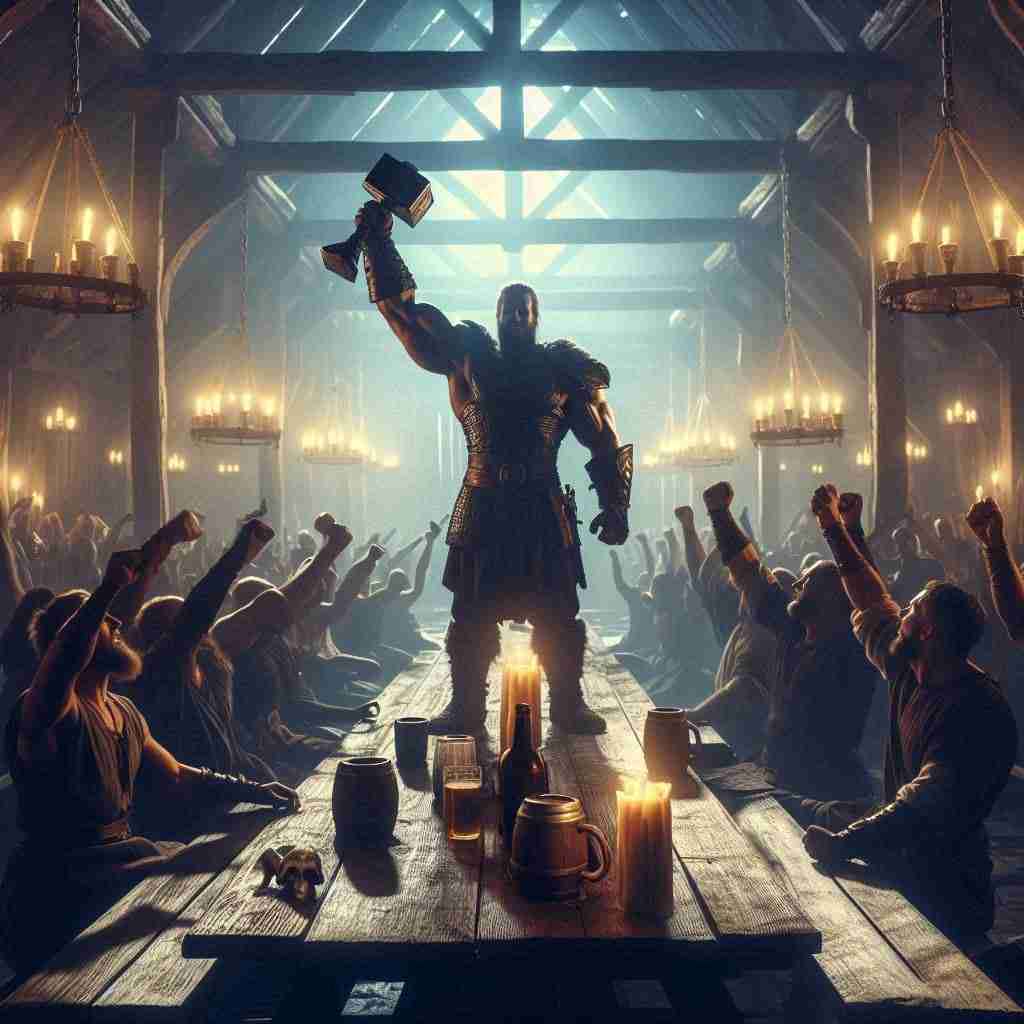Beowulf's Saga
Richard

In Geatland bold, a hero rose,
Beowulf his name, the tale it goes.
From shores of home to Hrothgar’s hall,
He heard the call, he’d heed them all.
Raise your horns, sing of glory,
Beowulf's brave, enduring story.
In the halls of kings and battle's fire,
He forged his fate, through realms dire.
Grendel came, a monstrous plight,
In Herot's heart, he struck at night.
Beowulf sailed o'er the sea,
To end the fiend and set men free.
With grip of steel, he faced the beast,
Tore limb from limb, the feast did cease.
Yet darker threats lay still in wait,
A mother's wrath, a dragon's fate.
In murky depths, the mother dwelled,
A vengeful heart, her fury swelled.
Beowulf dove into the deep,
To claim his victory and peace to keep.
Years did pass, a king renowned,
Yet one last foe would bring him down.
A dragon fierce with breath of flame,
Beowulf faced his final claim.
In ancient halls his deeds remain,
A hero’s song, a timeless strain.
Beowulf's name in saga lore,
Lives evermore, forevermore.
Richard's Beowulf's Saga
"Beowulf's Saga" is a stirring ballad that breathes new life into the ancient epic of Beowulf, capturing the essence of heroism, destiny, and the enduring power of legend. The song's structure, with its repeating chorus, "Raise your horns, sing of glory, / Beowulf's brave, enduring story. / In the halls of kings and battle's fire, / He forged his fate, through realms dire," serves as a rousing call to remember and celebrate the hero's deeds, much like the oral traditions that kept such tales alive for generations.
The lyrics deftly condense the sprawling narrative of Beowulf into concise, evocative verses. Each stanza highlights a key moment in the hero's journey, from his arrival at Hrothgar's hall to his final battle with the dragon. This structure not only makes the story accessible but also emphasizes the cyclical nature of heroic tales – each challenge overcome leads to another, greater test.
The song's opening lines, "In Geatland bold, a hero rose, / Beowulf his name, the tale it goes," immediately establish the legendary status of Beowulf. The use of "tale it goes" acknowledges the oral tradition through which such stories were passed down, adding an air of timeless myth to the narrative.
As the verses unfold, they paint vivid images of Beowulf's exploits. The battle with Grendel is described with powerful imagery: "With grip of steel, he faced the beast, / Tore limb from limb, the feast did cease." This visceral depiction captures both the physical strength and the decisive nature of Beowulf's victory.
The song doesn't shy away from the darker aspects of the tale. The line "Yet darker threats lay still in wait, / A mother's wrath, a dragon's fate" foreshadows the challenges to come and adds depth to the narrative. It reminds listeners that a hero's work is never truly done, and each victory may lead to an even greater challenge.
The final verses poignantly capture the bittersweet nature of Beowulf's fate. "Years did pass, a king renowned, / Yet one last foe would bring him down" encapsulates the hero's journey from young warrior to aged king, and the inevitable mortality that even the greatest heroes must face.
Throughout the song, the repeated chorus serves multiple purposes. It acts as a rallying cry, inviting listeners to join in the celebration of Beowulf's deeds. The image of raised horns evokes the mead halls where such tales would have been told, creating a sense of communal storytelling. The line "He forged his fate, through realms dire" emphasizes Beowulf's agency in shaping his own destiny, even in the face of supernatural threats.
The final stanza brings the story full circle, emphasizing the immortality achieved through legend: "In ancient halls his deeds remain, / A hero's song, a timeless strain." This conclusion reinforces the idea that while heroes may die, their stories live on, continuing to inspire and captivate audiences across generations.
"Beowulf's Saga" is more than just a retelling of an ancient tale; it's a meditation on the nature of heroism, the power of storytelling, and the human desire to leave a lasting legacy. By condensing the epic into song form, it makes the timeless themes of Beowulf accessible to a modern audience, inviting listeners to reflect on their own challenges and the stories they will leave behind.
This text was generated by AI and is for reference only. Learn more

